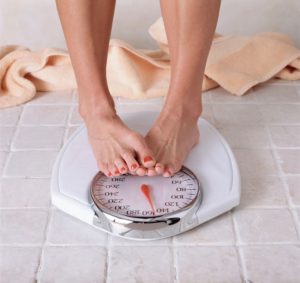This time of year, dense with “weight loss” ads on TV, always makes me reflect on how I feel about “dieting.” I’ve been at this a long time, and when contemplating this subject I try to consider my own biases. 
Having seen many fads come and go (when I started working as a nutritionist in the late 80’s fat was public enemy #1) my overwhelming belief is that over-restrictive weight loss plans fail to work in the long haul. Having said that, science suggests what’s most likely to be effective is for an individual to develop their own personal “portfolio plan” for weight loss made up of strategies that work for them, many of which are the result of lessons learned through past attempts at different programs. Some of those lessons involve what doesn’t work, which in my experience often includes buying all your food from the company (no need to deal with planning, shopping and cooking), drinking mostly protein shakes, or eliminating whole food groups (without a medical reason, like celiac disease and gluten). To sort out my thoughts for 2018, I compiled a list of the “pros” and “cons” of dieting. I’ll start by acknowledging there are always going to be people who find success with commercial weight loss programs, and I’m happy they found something that’s helped. Again, in my experience, that generally happens because they’re able to learn some strategies that stick because they make sense for them, but I consider them the exception, not the rule.
“Cons” of dieting:
- Diets often require following a set of rules based on a theme, not on science, or take some science-based principles and tweak them to support their program. Plans that ban all fruit, dairy, legumes, gluten-containing foods or grains (including whole grains), for example, often take one truth about a food and make a generalization. For example, fruit contains “sugar,” so therefore fruit isn’t good for you. Clearly, it’s not healthful to chug a lot of juice, but research actually ties eating whole fruits with lower rates of diabetes. Fruit is also filling and mostly water, so naturally low in calories.
- When it comes to weight loss, there’s no “one size fits all,” and many diets are comprised of universal rules to be followed. The factors that influence people’s weight are many and varied, and include genetics which likely influences how different people respond to different approaches.
- Diets often use “scare tactics,” even if they’re somewhat veiled by motivating messages – like the “if I can do so can you” thing that invariably makes people feel like failures if their results don’t stand up to the advertisements. I find the celebrity testimonials particularly annoying.
- Often these programs zero in on the “plan” without providing enough social or emotional support to make lasting change.
- In many instances, they’re a business with a goal of making money, as any profitable business would. It’s not a stretch to assume that might at times make it tough for them to avoid making decisions based on profits over the good of their members.
In my view, the biggest fallout from “dieting” is what I call the “Z-curve of Failure.” You start out following the rules and feel good because you’re “behaving” and “not cheating.” But eventually life throws marbles under your feet, causing a lapse that feels like failure, which often leads to dumping the plan and waiting for your self-esteem to rebound enough to make a new dieting attempt.
And the Pros?
- Adhering to a plan that suggests avoiding processed food or excess added sugars can help you break the cycle of consuming these foods or beverages on a regular basis.
- Many plans encourage eating more fruits and vegetables, which is always a good thing.
- Programs that offer group support, like Weight Watchers or TOPS (Take Off Pounds Sensibly) can be great for educating their participants on portion control and the benefits of social support.
- Tips gleamed from these programs may but helpful in developing a personalized plan, even if the specifics of the plan are not rigidly adhered to long term.
For me the bottom line is that following an eating plan that can’t – or shouldn’t – be followed long term tends to result in weight loss followed by regain, often more than was lost in the first place because more rapid weight loss may encourage excess loss of muscle, dinging your metabolism. In the end, maintaining a lower weight requires doing the hard work of figuring out how to change your default habits to those that create the calorie/metabolic balance needed to maintain a lower weight (smaller bodies need fewer calories for maintenance). There is no “golden ticket” after a period of suffering. Temporary change yields temporary results. And there are no foods someone can never eat unless they have an anaphylactic allergy to them. Not all carbs are toxic; many people can very comfortably eat whole grains, dairy or gluten-containing foods and successfully lose weight. Similarly, most people can’t, and shouldn’t, eat a diet that’s 75% fat forever, as is the case with the now-popular ketogenic diet, but eating more fat and protein and less carbohydrate for a couple of weeks may kick-start your motivation. Just be prepared for that inevitable plateau. That’s where the real work starts.

Pre-diabetes diet plan has been very educational for me. I use it as a source of motivation. Highly recommend it.